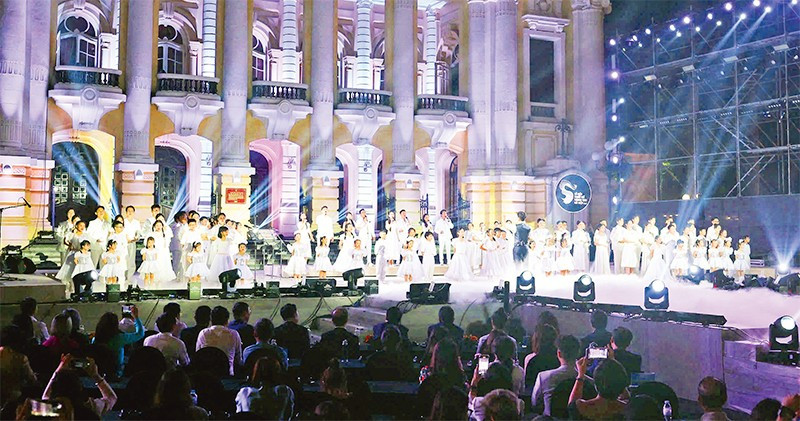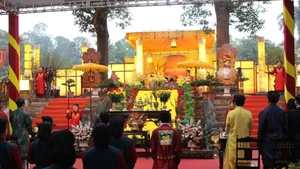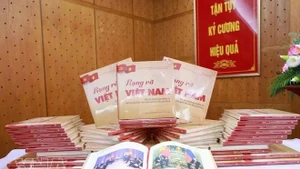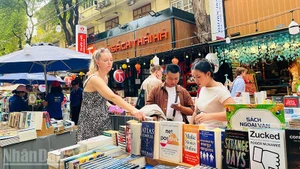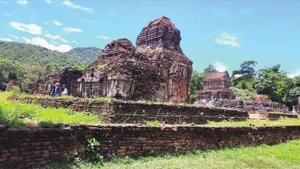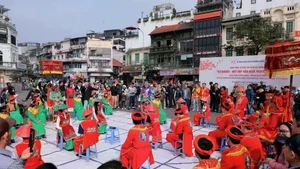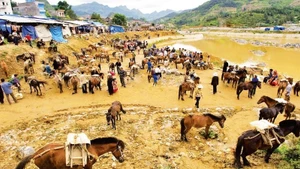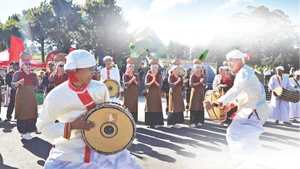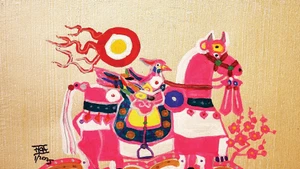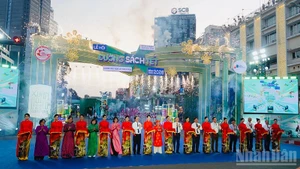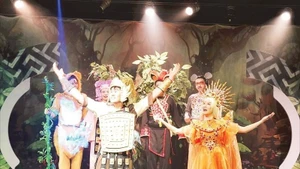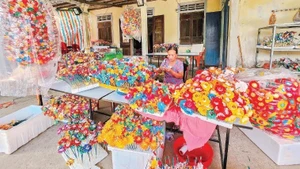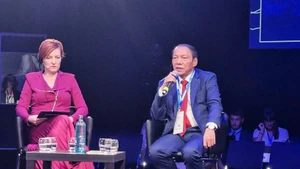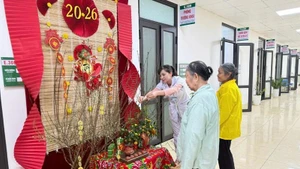While Hanoi was once renowned for its traditional spring festivals, the city now hosts cultural events and festivals year-round.
The City of Events and Festivals
The 2024 Hanoi Culinary Culture Festival, held at Thong Nhat Park (in Hai Ba Trung District), has concluded, delighting both the cultural sector and the artisans and culinary brands of the capital. With nearly 110,000 attendees, the event demonstrated its widespread appeal. Traditional delicacies of Hanoi like ‘pho’, ‘bun oc’ (rice noodle soup with snail), ‘banh tom’ (deep fried shrimp pancakes), and ‘com Vong’ (green sticky rice from Vong Village), attracted long lines of eager visitors. Lesser-known dishes such as ‘chao se’ and ‘chao go’ (rice porridge), specialities from Hanoi's suburban areas, were equally popular.
In addition to savouring culinary delights, attendees enjoyed vibrant cultural performances and unique interactive activities. Compared to the previous year, the 2024 Culinary Culture Festival nearly doubled its visitor count despite being hosted in the same space.
Le Thu Hang, a resident of Doi Can Street in Ba Dinh District, shared: “Visiting the festival, we did not just 'taste' dishes, we also learned fascinating insights about culinary culture. My children were especially intrigued watching robots prepare and serve pho”.
However, in terms of scale and appeal, the Creative Design Festival rightfully stands out as the largest cultural event of the year. Over its nine-day duration, the festival attracted more than 300,000 visitors, not including the countless outdoor activities that the organisers could not fully document. Held across the vibrant spaces of key streets of Ly Thai To and Le Thanh Tong, intersecting with Bac Co Slope and Trang Tien Street, the festival offered the public a wide range of 110 cultural and creative activities, including exhibitions, forums, experiences, stage performances, and a fashion show.
The most appealing venues for visitors included the University of Natural Sciences (formerly the building of the Indochina University, later known as Hanoi University), the Children’s Palace, and the Government's Guest House. Many attendees had to wait hours to explore and experience the cultural and artistic activities.
Pham Thi Lan Anh, Head of the Heritage Management Division under the Hanoi Municipal Department of Culture and Sports, said: "The significance of the Creative Design Festival lies not only in presenting artistic activities to the public but also in bringing arts and creativity closer to everyone. This fosters and nurtures a creative spirit within the community while simultaneously cultivating and developing a market for cultural and creative products—in other words, nurturing the market for the cultural industry".
Since the beginning of 2024, Hanoi has hosted hundreds of large-scale cultural, artistic, and sports events. Most of these have become annual fixtures, garnering widespread community interest. Notable examples include the Hanoi Tourism Festival, Hanoi Tourism Gift Festival, Hanoi Autumn Festival, Ao Dai Tourism Festival, Cultural Day for Peace, West Lake Lotus Festival, Hanoi Film Festival, and the Handicraft Fair. In recent years, many cultural and artistic events in the city have not only been held on a significant scale but have also reached international levels, with the most prominent being the Hanoi International Film Festival and the Monsoon Music Festival.
Apart from city-level events, numerous programmes have been organised by various sectors and localities. For example, during the Hanoi Culinary Culture Festival, the Night Tourism Promotion Programme titled “A Night in Truc Bach" in Truc Bach Ward, Ba Dinh District, left a strong impression on visitors. Domestic and international tourists were particularly drawn to the reenactments of daily life, activities, and artistic performances showcasing Hanoi's culture during the subsidy era.
The Van Phuc Village Cultural-Tourism-Trade Week (in Ha Dong District) is currently underway (from November 30 to December 6), highlighting the unique culture of the silk village and the craftsmanship of Van Phuc's silk weaving tradition. Even areas far from Hanoi's centre, such as Son Tay Town, have hosted large cultural events for the first time, events that no one previously imagined. Notable examples include the 2024 National Band Festival and the Ao Dai Heritage Beauty Contest, both held in November. These events attracted thousands of participants.
Standing Deputy Secretary of the Hanoi Party Committee, Nguyen Van Phong, once emphasised, "Without high-calibre events, there can be no cultural industry". Major cultural events throughout the year have created new momentum for developing the capital's cultural industry.
Elevating events into recognised brands
In February 2022, Hanoi became the first locality in the country to issue Resolution No. 09-NQ/TU on the development of the cultural industry in the capital city for the 2021–2025 period, with orientations toward 2030 and a vision to 2045. Among the key measures outlined in the resolution, the city explicitly identified the task of organising large-scale cultural, sports, and tourism festivals and events at regional and international levels. Hanoi also aims to host major international cultural events, attracting the participation of artists, cultural organisations, and individuals involved in the cultural industry, drawing widespread public and market attention.
Hanoi is gradually transforming into a "city of events" and a "city of festivals" by introducing new festivals while maintaining and enhancing the value of thousands of traditional ones. The growing public interest in these cultural events and festivals provides significant momentum for developing tourism and other cultural industries. However, to elevate these efforts into recognised brands, various factors still need improvement.
Phung Quang Thang, Permanent Vice Chairman of the Vietnam Society of Travel Agents, shared: "If we continue to harness the potential for organising large-scale festivals professionally and systematically, Hanoi will not only become an attractive cultural destination but also make a positive contribution to the development of the cultural industry. This will generate economic benefits by developing related services such as tourism, hospitality, dining, shopping centres, and, notably, fostering creative cultural products. However, to become a 'city of festivals', Hanoi must invest in cultural and artistic elements while also focusing on transportation infrastructure, tourism services, and public amenities. Additionally, the city should design tours that combine visits to cultural heritage sites with participation in festivals to enhance the experiential value for tourists", he added.
Permanent Member of the National Assembly's Committee for Culture and Education, Bui Hoai Son, emphasised that building a brand for cultural events is critical for developing the cultural business sector. Cultural events highlight local attractions, especially those that draw tourists, and provide opportunities for artists to showcase their talents and interact with peers, audiences, and other stakeholders. Effective branding of cultural events can expand their impact on the socioeconomic development of localities and the nation, strengthening soft power amid the current era of international integration.
Developing Hanoi into a "city of events" and a "city of festivals" is necessary, yet it requires corresponding infrastructure. Currently, the largest venue for outdoor events is the My Dinh Stadium in Nam Tu Liem District. Nevertheless, recent events have shown that the stadium cannot fully meet public demand. For instance, the 2023 Black Pink concert in Hanoi highlighted these limitations.
Moreover, experts suggest that cultural festivals need better coordination and management regarding timing and location. Hosting multiple festivals simultaneously can be counterproductive. For example, the Culinary Culture Festival and the Truc Bach Night Tourism Promotion Programme were both held over the same three days (November 29 to December 1), which inadvertently affected each other's success and failed to fully capitalise on their potential appeal.
